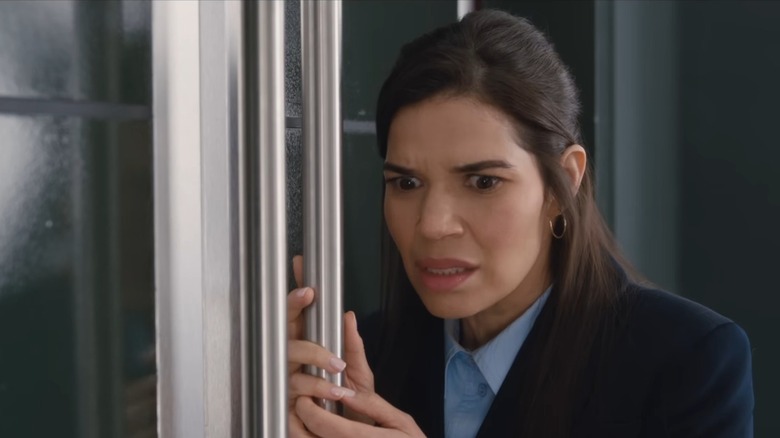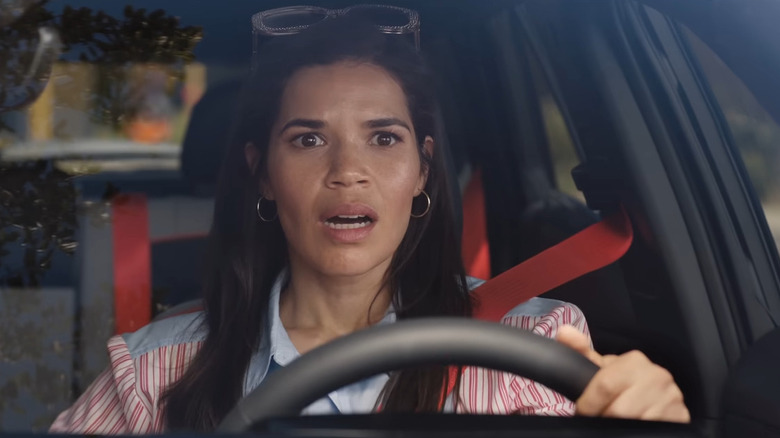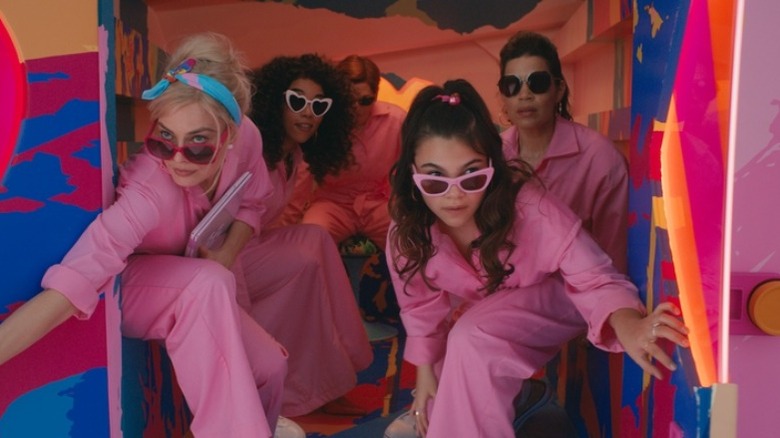It Took Multiple Days To Film America Ferrera's Barbie Monologue
"Barbie" spoilers follow.
To date, Greta Gerwig has directed three films she has also written or co-written. Each has a monologue, a scene, or a sentiment that lays out, in plain, often hard language, that being a woman is difficult in the modern world. To cite Gerwig's "Little Women," Jo (Saoirse Ronan) bemoans the fact that women are often seen as mere receptacles for love when they are, in fact, so much more. "Women," she says, "they have minds, and they have souls, as well as just hearts. [...] I'm so sick of people saying that love is just all a woman is fit for. I'm so sick of it."
The trend continued with Gerwig's latest film "Barbie," based on the Mattel toy and currently raking in hundreds of millions of dollars at the box office. "Barbie" is an Adam & Eve story wherein Barbie (Margot Robbie) travels from the safe, gentle, ideal, empowering, plastic world of Barbieland into the real world where, shockingly, women don't rule the world. It is Ken (Ryan Gosling) who carries the forbidden fruit of the patriarchy — a concept neither Barbie nor Ken was familiar with — back to Barbieland. The results are disastrous.
A human from the real world, Gloria (America Ferrera) observes Barbie's existential crisis and enters Barbieland to assess the damage. The Barbies therein are unprepared for toxic masculinity and are brainwashed by the new concepts. It takes a speech from Gloria — a speech about how the real world expects far too much of womankind — to shake the Barbies from complacency. It's a moment to elicit both applause and righteous weariness.
In a recent interview with Vanity Fair, Ferrera declared she knew the monologue was important, and that she had to do 30 to 50 takes to get it just right.
Gloria
The character of Gloria is the audience's avatar. She is the one playing with Barbie dolls in the real world, all in an effort to bond with her teenage daughter (Ariana Greenblatt), who is growing increasingly estranged from her mother and moving into a cynical state of mind. As a Mattel employee, Gloria will begin idly drawing pictures of Barbie dolls who think about death and depression, unwittingly shunting dark thought's into Barbie's head. Gloria is torn between the idyllic world that Barbie dolls sell — girls can be anything! — and the harsh realities of living as a woman in the real world. Near the end of "Barbie," Gloria unleashes on the Barbies a litany of modern feminine grievances, all of them about how much is expected of women and how she feels like women will never be able to live up to the world's vision of them as a gender.
Ferrera saw the speech as both a gift and a challenge. Actors often dream of receiving important speeches and "big moments," and Ferrera was thrilled. She also, however, wanted to make sure that she got it right. She said:
"[The monologue was] one of the first things Greta mentioned to me even before I read the script. She said, 'I wrote this monologue for Gloria, and I've always imagined you saying this.' While that was flattering, it also felt like pressure in the nicest way. I read the monologue and it hit me as powerful and meaningful. It also felt like, wow, what a gift as an actor to get to deliver something that feels so cathartic and truthful. But it also felt like this pivotal moment that I obviously didn't want to mess up. There was a little bit of healthy pressure around it."
The truth
Ferrera knew that "Barbie" was a frothy, fantastical comedy film and that Gerwig wanted the tone to be light. As such, the actress was unsure as to how silly her director wanted the scene to be. She was prepared to go broad with it, but Gerwig surprised her by asking for something intense and truthful. It wasn't even a light, simple, Barbie-fied version of the truth. It was a real speech from a real person.
Ferrera recalls that the speech took two full days to shoot, partly because she wanted to nail it, but also because she's delivering the speech to a room full of Barbies, and Gerwig wanted to get reactions from each of them. This allowed Ferrera to perform the monologue many, many, many times. She said:
"We shot it over two days. It's one part of a much bigger scene with lots of characters in it. I had to do it many, many times for other people's coverage and to get through the whole scene and over the course of two days. But she gave me so much freedom with it."
The actress assumed Gerwig might dictate inflections or cadence to certain portions of her dialogue, but she did not. "I thought maybe this would be like that," Ferrera said, "but it was the opposite. She wanted me to completely make it my own and find it as we did it." How many times did she actually do through the entire thing?
"It felt like 500. I'm sure it wasn't. It was probably 30 to 50 full runs of it, top to bottom. By the end, Ariana recited the monologue to me because she had memorized it because that's how many times I had said it."
Regardless, Ferrera nailed it.


